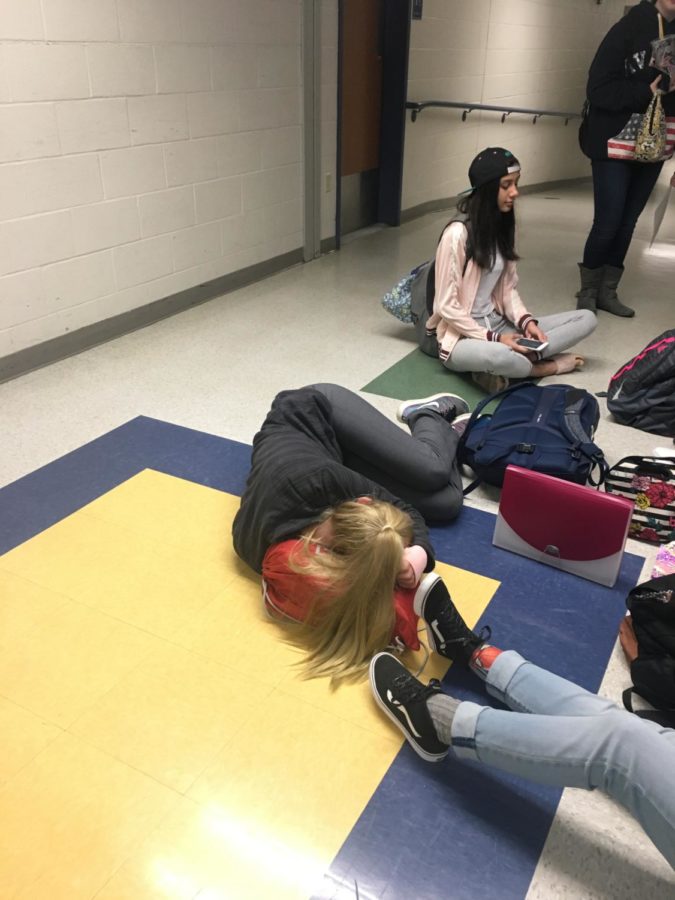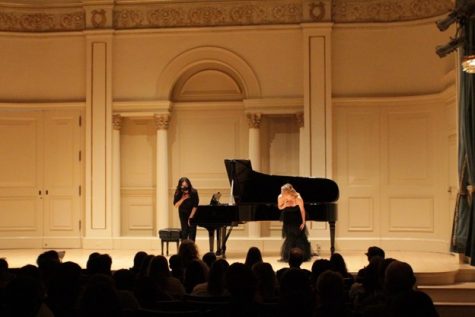Students don’t snooze, and lose?
Schools consider later start times
Junior, Hannah Howard, catches a few z’s before classes start.
October 20, 2017
At 7 a.m., the sun barely over the horizon, students stumble off school buses and walk zombie-like into the doors of Lewis Mills High School. Most have only gotten between five and six hours of sleep before rolling out of bed to catch the bus in the dark. But, there could be hope for the tired teens. Many studies conclude that starting school later greatly improves the health of teenagers. Later start times in schools would seem to be a positive change for the students, but the execution and logistics are holding districts back.
According to Principal Christopher Rau, this newfangled idea has not been mentioned at any recent Board of Education meetings. But if student interest seems high, a proposal to the board could be good start to spur a change. Neighboring towns including Simsbury have begun to talk in their own Board meetings of later start times, and Newtown implemented an 8 a.m. start time this year. Positive results from these towns could lead other schools to follow, Rau indicated.
Students and teachers at Lewis Mills appear to be divided in their opinions of a potential later start time for the high school. Many people like the general idea, yet worry over the execution and question if it would really be successful or helpful for students. Debra Atkins, a paraeducator at the school, says that although she believes that starting later would be beneficial to the health of students, especially those who are older, it limits preparation for the real world. She says that “pushing back start times wouldn’t help students get ready for real jobs, which don’t pause so they can get enough sleep.”
Dean of Students Steve Schibi worries about the logistics of introducing later start times. He agrees that teenagers need more time to sleep in the morning, but “the real issue is the after-school activities.” He thinks that it would be difficult for sports and after-school activities to be scheduled due to school getting out later. Not only would changing times affect students, he says, but it would also affect how the school runs. Schibi stated that it would force the district to “renegotiate contracts with employees,” and change how “sports teams that come and go” are run. However, Principal Rau points out that people tend to be scared of change. He says, “People tend to focus on the problems; they find it easier to continue with what they know.” Pushing back the school start times would be a big change, but he also thinks people would be able to adapt. He would “love to see a possibility of school starting later.” Despite Rau’s positivity, he admits that this change “isn’t very high on his priority list.” Region 10 is very far away from this drastic change even being a possibility.
While teachers and administration are on the fence about a change, Megan Kolenda, a senior at LSM, believes later start times would be the perfect way to improve a high school. As a student who understands the situation better than anyone, she says that allowing time to sleep would “help students to be fully functional for the day,” which seems to be correct; according to an experiment at Oxford University, the teenage brain doesn’t become fully functional until nine or ten in the morning.
Despite the conflicting views, Rau says that he thinks “the Board of Ed would love to hear from students.” Although it hasn’t been mentioned at any board meetings, it seems to be something that the administration may take a future interest in. Students are encouraged to speak up in order to elicit change. Strong student support for the cause could spur change in school policy sooner than expected.









